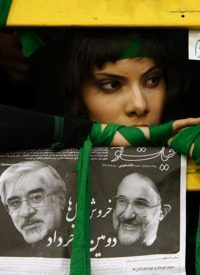
Crowds of opposing demonstrators supporting both Ahmadinejad and Moussavi engaged in protests — and sometimes clashed — in the days following the election. Iran’s government-funded Press TV stated that seven people were killed on the night of June 15 during demonstrations in Tehran.
As we observed in yesterday’s report, "Iran Election Aftermath," while the presidency is the highest office filled by a direct popular vote, Iran’s president does not make foreign policy or command the nation’s military. The highest ranking political and religious authority in the nation is the supreme leader, currently Ayatollah Ali Khamenei.
Though Mousavi has made an official appeal against the election result, analysts believe a re-run could only be held with the intervention of Khamenei, who has publicly backed Ahmadinejad. Reuters news quoted analysts who say it is very unlikely Khamenei will intervene by calling for a re-run because it could lead to moderates winning subsequent elections, including the next parliamentary election in 2012.
One analyst opined that the fate of the protests could hinge on whether Mousavi — who served as prime minister for eight years and was an ally of the late Ayatollah Ruhollah Khomeini — is willing to become an opposition figure. "He is part of the Islamic Republic and believes in religious leadership," the analyst said. "He would not want to put the system in danger."
A June 16 report from Bloomberg news emphasized the degree to which the Iranian government has cracked down on protests and media coverage of any demonstrations not pre-approved by state officials. The report quoted from a faxed statement issued by the Culture Ministry’s office for the foreign media in Tehran, which said: "No reporting activities should take place without coordination and permission of this office. Reporters should not take part in news events that have not been announced by this office." The statement added that reporters should avoid being present at or covering "illegal protests" without the permission of the Interior Ministry.
Another quote cited the Centre for Arab and Iranian Studies in London, which said in a statement that Iranian authorities also closed al-Arabiya television’s office in Tehran. "They’ve cut off telephone, e-mail, texting, and for foreign press issued a letter saying nobody can report without permission," the statement observed. The Centre noted: "Twitter is the one thing being used. It’s a sign of crackdown. They don’t want people outside Iran to see what’s going on there."
Another source cited by Bloomberg was Geneive Abdo, an Iran expert at the Century Foundation, a New York-based research group, who said in an interview that it is more likely now "that there will be a crackdown and they will use force." Abdo also stated: "They prefer to kill people if necessary and calm the situation, if it continues like this, it will turn into a serious rebellion."
The Voice of America (VOA) reported that the United States, France, Germany, and other countries have expressed concern about the election and about how the anti-government protests are being handled in Iran.
And to think that the Western press once complained that the government of the pro-Western Shah Mohammad Reza Pahlavi was repressive! (See "Iran and the Shah: What Really Happened")
Photo: AP Images



